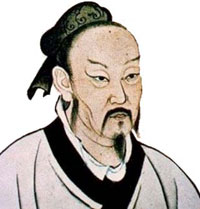 Chuang Tzu ( Zhuang Zhou / Zhuangzi) (369BC – 286BC) was a leading Chinese philosopher representing the Taoist strain in Chinese thought. Using parable and anecdote, allegory and paradox, he set forth the early ideas of what was to become the Taoist school. Central in these is the belief that only by understanding Tao (the Way of Nature) and dwelling in unity can man achieve true happiness and be truly free, in both life and death. Witty and imaginative, enriched by brilliant imagery, making sportive use of both mythological and historical personages (including even Confucius), the book which bears Chuang Tzu’s name has for centuries been savored by Chinese readers.”
Chuang Tzu ( Zhuang Zhou / Zhuangzi) (369BC – 286BC) was a leading Chinese philosopher representing the Taoist strain in Chinese thought. Using parable and anecdote, allegory and paradox, he set forth the early ideas of what was to become the Taoist school. Central in these is the belief that only by understanding Tao (the Way of Nature) and dwelling in unity can man achieve true happiness and be truly free, in both life and death. Witty and imaginative, enriched by brilliant imagery, making sportive use of both mythological and historical personages (including even Confucius), the book which bears Chuang Tzu’s name has for centuries been savored by Chinese readers.”
“Flow with whatever may happen, and let your mind be free: Stay centered by accepting whatever you are doing. This is the ultimate.”
– Chuang Tzu
When Chuang Tzu was about to die, his disciples signified their wish to give him a grand burial. `I shall have heaven and earth for my coffin and its shell; the sun and moon for my two round symbols of jade, the stars and constellations for my pearls and jewels; and all things assisting as he mourners. Will not the provisions for my funeral be complete? What could you add to them?’
Selections from Chuang Tzu Poetry
- Creation and Destruction
- Distinguishing Ego from Self
- Goods and Possessions
- Letting go of thoughts
- One Legged Man
- Surrendering

